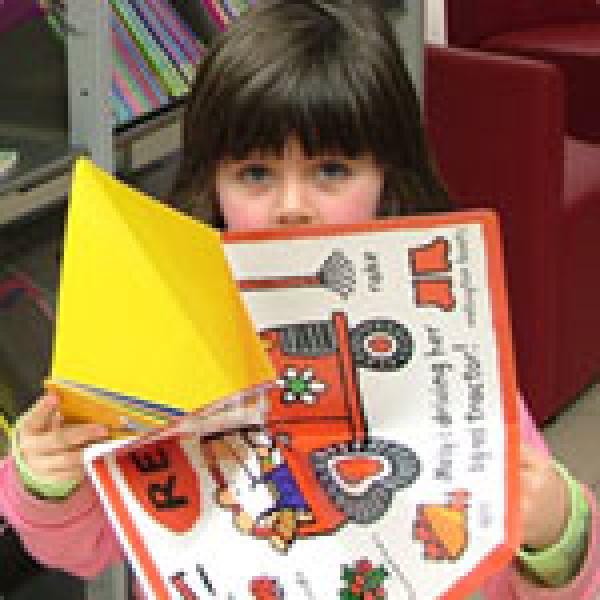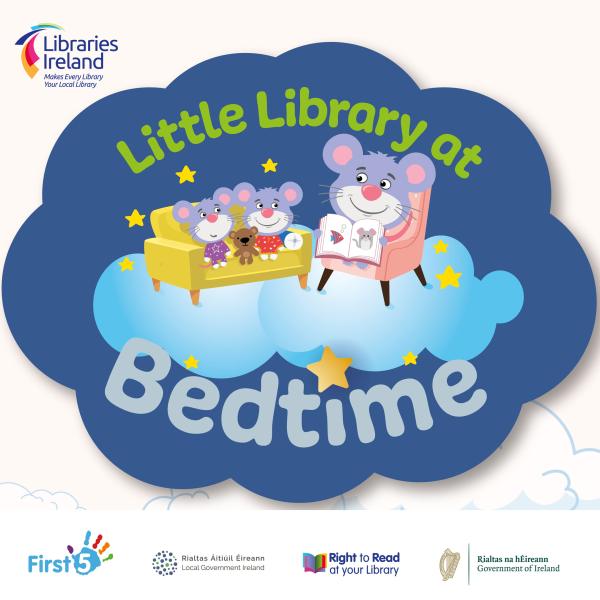Supporting Children’s Reading
Speaking, reading and writing are among the most important skills children learn. Reading, either independently or through shared reading, helps children to develop their imagination, enhance creativity, strengthen oral language development and communicate more effectively.

When children come across the same words in many different places and contexts, they develop a stronger understanding of their meaning and use. If a child hears new words through conversation and also when read to them in a story, they have a firmer basis for making associations between words, allowing them to more easily learn and recall the word.
Let’s Talk
- Talk to your child about the things you see around you everyday such as pictures, words, shapes and numbers.
- Point out letters and words you see while walking, driving, on the bus etc. Make it into a game by asking your child to find a new word on each outing.
- Encourage your child to give their reactions to stories, what they watch on TV or on the Internet. If you are reading a book together, ask them to guess what will happen next or to tell the story back to you in their own words.
- As your child begins to read on their own, talk with them about what they are reading. When they finish a new story, discuss the main ideas, new words and their favourite parts.
Finding the Right Book
Help children to choose the ‘right book’ to read
Enjoyable and interesting
Choose books that they will enjoy, find interesting and/or relate to their day-to-day lives.
Appropriate to their reading level
If there are more than five words on a page that your child doesn’t understand, they should pick a book that is slightly easier.
Easy to understand
A book is suitable to your child’s reading ability if, when they read a page from it aloud, they are able read it smoothly and without much difficulty.
Other ideas for improving children’s reading ability
When your child finds a word they don’t understand, try to avoid telling them the meaning straightaway. Ask them instead to guess what the unknown word is likely to be based on the pictures near to it or by looking at the sentence around it.
Reread favourites. Most children love to hear their favourite stories read many times. Repetition will strengthen language development.
Books with age guides can be helpful, however don’t feel restricted by these. It is important that your child feels comfortable reading the book they choose.

Reading for Pleasure
Reading for pleasure has been identified as a significant component in children‘s acquisition of literacy. ‘Reading for pleasure‘ has been defined as: ‘Reading that we to do of our own free will, anticipating the satisfaction that we will get from the act of reading. It also refers to reading that having begun at someone else‘s request we continue because we are interested in it.’ (Clark and Rumbold 2006, 6).
When children ‘read for pleasure‘, according to the renowned linguist, Stephen Krashen:
“[Children] acquire, involuntarily and without conscious effort, nearly all of the so-called ―language skills many people are so concerned about: they will become adequate readers, acquire a large vocabulary, develop the ability to understand and use complex grammatical constructions … Although free voluntary reading alone will not ensure attainment of the highest levels of literacy, it will at least ensure an acceptable level” (Krashen 1993, 85).
Other studies have identified an association between reading for pleasure and increased reading attainment and writing ability, greater breadth of vocabulary and greater general knowledge.
Story Time
Everyday Establish a routine and try to devote some time everyday to reading.
Fun Read with fun, humour and expression in your voice.
Pictures Draw your child’s attention to pictures in the book and discuss them together.
Questions Ask questions as you read and encourage your child to give their reactions to the story.
Special Make reading time special by choosing a comfortable space away from any distractions
When?
Share books every day and try new learning activities regularly. Make reading a routine, natural part of your child’s day that is done for fun and enjoyment.
It’s never too early to start reading to your child. Just five minutes each day can be enough. Even very young babies respond to being held while hearing the familiar, calming sound of a book being read aloud.
Continue to read with your child even when they are able to read on their own. Your interest in sharing stories will encourage them to further develop an interest in reading themselves.
Everyday Fun
Simple everyday activities around the house can be very easily turned into fun games that help your child develop important skills.
Shapes
Draw your child’s attention to different shapes. When looking at pictures, point out a ‘square house’, a ‘rectangular football pitch’ etc. or ask them to name the shapes you see around you every day.
Give your child simple jigsaws to play with. Fitting pieces together helps children understand different shapes and match patterns.
Comparing
Point out things you see when walking outside which are big and small, wide and narrow, cheap and expensive etc. Make a game out of comparing opposites!
Matching and Sorting
Play matching and sorting games. For example, sort different categories of toys in different boxes with your child or match items of the same colour.
Lists
As they become more confident writing words, ask them to write down a list of items to buy for weekly shopping or keep a ‘to do’ list for the household.
Dictionaries and Journals
Create a simple, homemade dictionary with your child and ask them to add in new words they learn each week. As they develop greater confidence writing on their own, encourage them to keep a journal or write their own short stories.
Easy Numbers
Counting
Involve your child in counting activities around the house or when walking outside. For example, counting the number of cups and plates to be laid on the table, the number of people in a room or the number of buses you pass on the street.
Adding and Subtracting
When your child becomes more familiar with counting, ask them to do simple calculations for you. For example, they can sort out coins for you or add and subtract money from a total amount before you go to buy something or when shopping.
Times and Dates
Let your child know the time each day that certain things are done. For example, ‘It’s 8 o’clock, time to get up’. Mark in dates on the calendar with your child. Regularly look at it together to count down days or check whose birthday is coming next.
Weighing
Involve your child when weighing items on weighing scales or when measuring using a ruler. Turn the activity into a game by giving them several items to weigh or measure and asking them to predict beforehand the order of heaviest to lightest or longest to shortest.
Top Tips
- Choose fun activities that your child will enjoy and/or relate to their everyday experiences.
- Leave books, paper, pencils and markers around the house for your child to pick up whenever they want.
- Keep books, stories and games appropriate to their age level. If too hard or too easy, they may lose interest or confidence.
- If your child finds it difficult to sit and listen to a story, provide them with paper and pencils so that they can draw while they listen.
- Comic books or graphic novels can be a good way of helping children to follow the story if they have difficulty reading.
- Give lots of encouragement and praise for even the smallest accomplishment.
- Focus on the enjoyment and fun of reading. If you show an interest in reading and learning yourself, your child will be more likely to follow your lead and explore as well.